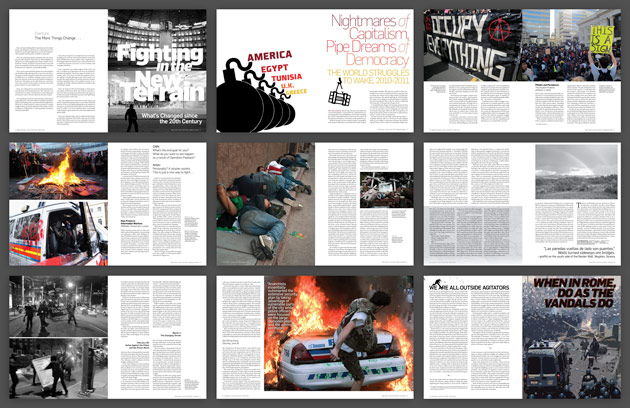This month, we are publishing a series exploring an anarchist analysis of democracy, including case studies from anarchist participants in directly democratic movements around the world. As an offline counterpart to the series, we invite you to organize discussion groups about the relation between democracy and anarchy. We’re not finished thinking through this topic, and we want your help engaging with these questions. Our hope is that together we can produce new ideas and tactics that can be put to use in the next wave of unrest.
To facilitate all this, we’ve prepared print-ready PDF of the flagship text in the series, “From Democracy to Freedom”:
From Democracy to Freedom imposed PDF [6.5mb]
To complement what we hope will be a network of such discussion groups, we’ve established a participatory forum utilizing our comrades’ platform Crabgrass, here:
we.riseup.net/democracyandanarchy
Here’s how to use the forums:
- Visit we.riseup.net and make yourself a user profile.
- Click on the “Settings” tab and configure your profile to match your needs.
- Click on the “Groups” tab at the top left of the page (next to the raven icon).
- From the “Groups” tab, select “Search” from your options on the left. Type “democracyandanarchy” into the search box and click “Search.”
- Join the “democracyandanarchy” forum by clicking on it and then clicking “Join Organization” on the left. This enables you to read and contribute to discussion threads.
- Commence critiquing the articles, posing and answering hard questions, summarizing the discussions you’ve had offline, and more!
Ideally, we’d like people to meet in person to discuss the texts, even in groups as small as two, and to use the online forum to compare your thoughts with other groups and pose each other questions. If you lack offline community, or want to share the discussion from your local group, we hope the forum can connect you with others who share your interests. The Ex-Worker podcast will draw material from the discussions on the forum to include in future episodes of the podcast.
You can draw from and add to a list of discussion questions for reading groups at the forum site. If you have technical questions about using Crabgrass or other Riseup services, try the Crabgrass Help Pages. You can also email us at rollingthunder@crimethinc.com.














